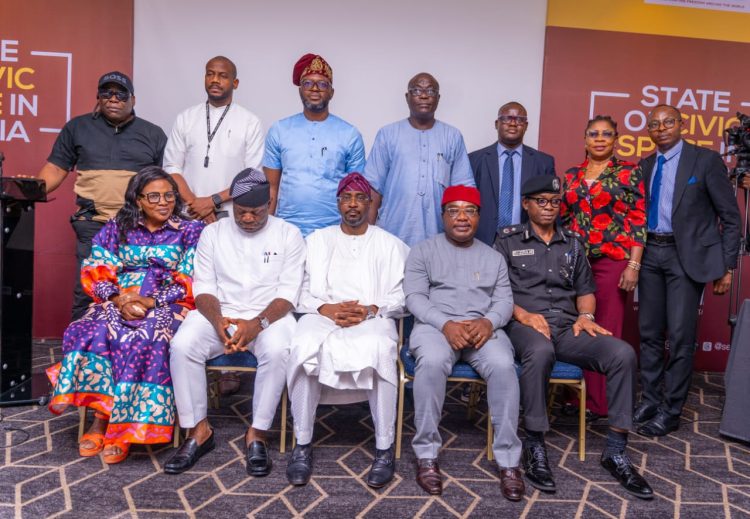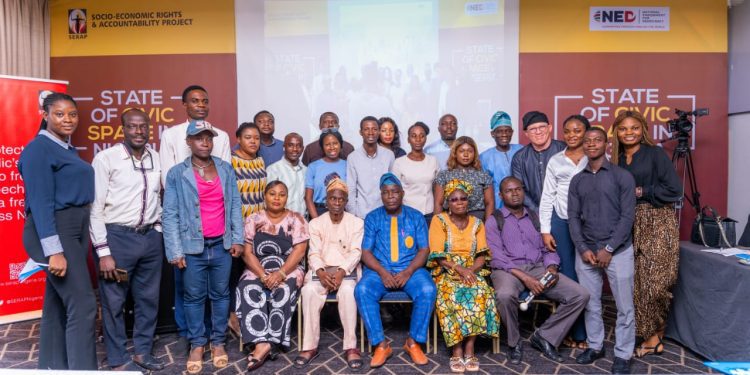The Socio-Economic Rights and Accountability Project (SERAP) has called on the Nigerian government to review laws that restrict freedom of speech and press freedom.
The call was made at an interactive session on ‘the state of civic space in Nigeria’ organized by SERAP in collaboration with the National Endowment for Democracy (NED).
The group advocated for the establishment of a legal framework that protects and promotes human rights, urging the Federal Government of Nigeria to reassess laws such as the Official Secrets Act, Criminal Code Act, and Cybercrime Act, which may impose limitations on free speech and press freedom, and amend them in line with international human rights standards and agreements, including the declaration for the development of free, independent and pluralistic press.
Dr. Bunmi Afinowi, a lecturer from the Faculty of Law, University of Lagos (UNILAG), while presenting SERAP’s report titled “Crackdown on Media Freedom and Civic Space in Nigeria,” said the judiciary has a role to play by ensuring that it upholds the rule of law and safeguards human rights and as enshrined in the constitution”.
Dr. Afinowi advocated the need for professional bodies and civil society to form coalitions and support organizations working on media freedom and human rights issues.
“The judiciary has a role to play in this regard by ensuring that it upholds the rule of law and safeguards fundamental human rights as recognised and enshrined in the constitution.
“Bodies like the National Human Rights Commission, the Nigerian Union of Journalists and relevant civil society groups must ensure prompt and thorough investigations into the attacks on journalists and hold perpetrators accountable.
“There is also a need for professional bodies and civil society groups to encourage coalitions and ensure adequate funding, capacity building and technical support for civil society organisations working on media freedom and human rights issues.

Delivering his keynote address, Mr. Eze Anaba, President of the Nigerian Guild of Editors (NGE), addressed the shrinking civic space in Nigeria due to repressive laws and increased restrictions on freedom of expression, assembly, and association.
He expressed serious concerns over the clampdown on media freedom in Nigeria, citing the recent abduction of the editor of FirstNews Newspaper by individuals reportedly in military uniform. He condemned the act saying “arbitrary arrest of journalists and restriction of civic space have no place in democracy.”
“The civic space increasingly is under pressure in Nigeria, from repressive laws and increased restrictions on freedom to express, participate, assemble, and associate.
“The media has an important role to play to achieve effective promotion and protection of human rights and to hold government at all levels to account for restrictions of the civic space,” he said.
Anaba cited the constitutional mandate outlined in Section 22 of the Nigerian constitution, which charges the media with the responsibility of safeguarding human rights and holding the government accountable.
“Section 22 of the Nigerian Constitution as amended has created the meaning and purpose of our profession and the role we are to play in the protection of human rights and to hold government at all levels to account for violation of such.
“It also provides that the press, radio, television, and other agencies of the mass media shall at all times be free to uphold the fundamental objectives contained in this Chapter and uphold the responsibility and accountability of the Government to the people.
“The media plays a crucial role in preserving civic space by providing information, holding government accountable and fostering public discourse.
“In a shrinking civic space like ours where freedom of expression and association are limited, the media role becomes even more vital in amplifying marginalized voices, and challenging oppressive regimes,” he said.
He called on both the federal and state governments to uphold the rule of law and protect the right to freedom of expression, peaceful assembly, association, and civic space in Nigeria.
Human rights lawyer, Mrs Funmi Falana (SAN), lamented the ongoing intimidation of journalists, activists and trade unionists by the police and security agencies despite the provision of the constitution. She stated that the Nigerian Constitution guarantees protection for public space, and fundamental rights such as freedom of expression, assembly, and association.
Mrs. Falana urged the media and civil society organizations (CSOs) to challenge attempts by the government to constrict the civic space, warning that constriction of the civil space is a tactic used by governments to evade accountability.
She recognized the efforts of CSOs who have challenged the government and relevant bodies’ attempts to constrict the civic space, including Media Rights Agenda (MRA)’s lawsuit against the National Broadcasting Corporation (NBC).
She said, “From time to time, the Nigeria Broadcasting Corporation closes down media houses and imposes fines for alleged breaches of the provisions of the Nigeria Broadcasting Code. The Media Rights Agenda sued the NBC following the commission’s imposition of fines of N5m each on Multichoice Nigeria, owners of DSTV; Trust TV; NTA-Startimes Limited and Telecom Satellite Limited for airing documentaries on bandits in 2022 that allegedly undermined Nigeria’s national security.
“In a judgement delivered on January 17, 2024, the Federal High Court declared null and voided the code authorising the NBC to impose fines on broadcast stations on the grounds that administrative and regulatory bodies cannot exercise judicial powers.
“The presiding judge, Justice Rita Ofili-Ajumogobia, held that the NBC acted above its powers by imposing such fines, thereby setting aside the fines imposed and declaring the regulator’s action as wrong and unjustifiable in a democratic society.
“The Judge issued an order of perpetual injunction restraining NBC or anyone acting on its behalf from further imposing any fine on any media platform or broadcast station in Nigeria for any alleged offence committed under the NBC code. The Judge commended the Media Rights Agenda for filing the case.”
She urged lawyers to constantly use public interest litigation to counter restrictions on civic space and hold the government at all levels to account for violations of human rights.
Chairman, House Committee on Media and Public Affairs, Mr. Akin Rotimi (Jnr), said “No amount of introspection on the civic space can be described as too much or too little. This is particularly so seeing that there are divergent views on what level we are in terms of democracy.”
He encouraged civil societies to leverage on the new members of the House of Representatives, which are about 75%, to cultivate new partnerships and change the narratives.

